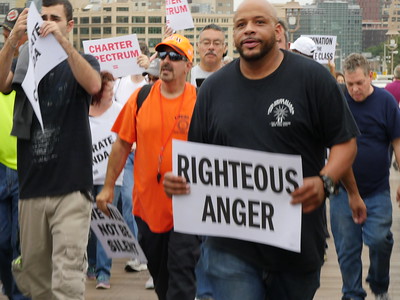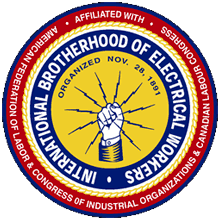New York, NY – The 21st Century Antitrust Act now attempting to make its way though the State Legislature could have prevented the disastrous 2016 merger between Charter Communications Inc. and Time Warner Cable.

Charter’s takeover sparked what turned into the longest strike in U.S. history on March 28, 2017, and upended the lives of scores of longtime techs with IBEW Local 3. But advocates for the 21st Century Antitrust Act rallying today inside the State Capitol in Albany, say that all could have been avoided if the law was on the books six years ago.
A newly-issued report from New Yorkers for a Fair Economy [NYFE] finds stultified antitrust laws unchanged since passage of the Donnelly Act in 1893, paved the way for the creation of the second-largest cable company in the country, the largest in the Empire State, and a devastating assault on 1,800 striking IBEW Local 3 workers.
“It was allowed after Charter made several promises to regulators at the Federal Communications Commission, including a promise not to place data caps on customers for seven years – in other words agreeing not to ‘charge customers more if their internet use’ exceeded certain levels until mid-2023,” the NYFE report says. “The company went on to request that those conditions be dropped two years early. Shortly after the merger, the company also began an attempt to ‘replace its union health insurance and pension plans with a company-run 401(k) pension account and health plan,’ and proceeded to crackdown on its unionized workforce represented by IBEW Local 3.”
NYFE is a statewide coalition consisting of labor advocates, community organizations, small businesses and elected officials coalescing around passage of the 21st Century Antitrust Act. The legislation, sponsored by Senate Deputy Michael Gianaris and Assemblymember Jeffrey Dinowitz, remains stuck in both houses.
Striking Charter/Spectrum worker Alfred Boothe warned against unchecked corporate power when he spoke to LaborPress back in February 2018. “If you don’t put the pressure down now other companies could come to New York and feel free to do what they want to do, or manipulate whatever they want to manipulate,” he said. “It’s sad that the elected officials that we vote for, who we feel have our best interests at heart, really don’t. I thought they would do more. But nothing has really moved. Nothing any politician has done has moved [the strike].”
Lack of meaningful antitrust laws have also allowed Amazon and other corporate giants to drive down wages and standards for warehouse workers and delivery drivers. NYFE’s analysis of Bureau of Labor stats additionally finds the average annual pay for warehouse workers fell more than $6,000 in the last decade. Delivery drivers spent the years between 2010 and 2020 going backwards, seeing their annual pay nosedive nearly $5,000.
Teamsters Local 804 member Anthony Rosario is a UPS driver cited in the NYFE report. He says the job used to pay him middle-class wages and allow him to spend nights and weekends with his family. But those days are gone.
“Amazon pays workers half as much as we make to do the same jobs. Amazon has increased quotas and started weekend deliveries. That has already trickled down to other companies and it is affecting my family. I am working longer hours and missing my kids’ karate matches. It hurts to have to tell them I won’t be there because I am working. How long can union companies hold out before either losing business or coming down to Amazon’s level?” Rosario says.
Teamsters Local Local 863 member George Boada, expressed similar concerns last winter at rally protesting plans to construction a new Amazon travel hub at Newark International Airport.
“As companies fold under Amazon’s weight, it’s either you join them, or you go by the wayside,” Boada said outside the Port Authority of New York & New Jersey’s 4 World Trade Center offices in December. “That’s what we’re facing. We’re facing a juggernaut — they’re not stopping.”



